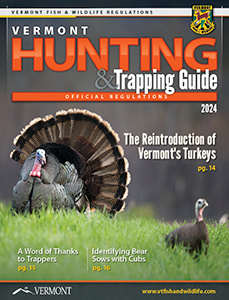Big Game Hunting
Definition
Deer, bear, moose, wild turkey, caribou, elk, and anadromous Atlantic salmon (taken in the Connecticut River Basin) are considered “big game.”
Tagging
A big game animal must immediately be tagged when taken. The tag shall be placed on the carcass in a location that is open to view and shall remain there during possession and transportation, until the animal is cut up for consumption. Either a paper tag or durable tag may be used. Any tag used must include the information (name or Conservation ID number) on the tag identifying the person that took the animal before transporting the carcass.
Reporting
A person taking big game shall within 48 hours report the taking and exhibit the carcass to the nearest game warden, official Fish & Wildlife Department Reporting Station, or to a person designated by the commissioner to receive the reports. Deer and bear must be field dressed prior to reporting. No big game carcass shall be transported out of state without first being reported.
A hunter must take a warden to the kill site of a deer or bear if requested by a warden.
Turkeys, archery season deer and muzzleloader season deer may be reported on our website at this link: https://vtfishandwildlife.com/hunt/big-game-reporting or at an official reporting station. Youth, Novice and Regular November season deer must be reported at an official reporting station.
Biological Information
Proper management of big game populations requires the collection of critical biological data that is used to estimate the size and health of the populations. Successful hunters need to make every effort to provide this information when reporting a big game animal.
Transporting
It is illegal to transport big game taken by any illegal means, or taken in closed season. Deer do not need to be visible when transported. A person shall not transport game taken by someone else unless the person who took the game accompanies it.
All other regulations regarding the transportation of fish or game apply to the transportation of big game. Transporting parts of big game is prohibited unless the parts or the package containing them are marked with the name and address of the person who killed the animal(s).
Importing
In order to legally transport into Vermont and possess big game that was legally taken in another state or country, a person must keep the tag that is required by the state or the country where the big game was taken. Each package of meat must be marked with the name of the person who took the animal, tag number, date, and state or country of origin.
Rules on importing and possession of deer or elk from areas with chronic wasting disease (CWD) and captive hunt areas or farms:
It is illegal to import or possess legally taken deer or elk, or parts of deer or elk, from states and Canadian provinces that have, or have had Chronic Wasting Disease, or from any captive hunt or farm facilities, regardless of its disease history, with the following exceptions:
- Meat that is boneless.
- Hides or capes with no part of the head attached.
- Clean skull-cap with antlers attached.
- Antlers with no other meat or tissue attached.
- Finished taxidermy heads.
- Upper canine teeth with no tissue attached.
Other fish or game legally taken in another state or country may be possessed and transported into Vermont in the presence of the person who took that fish or game.
Illegal Means of Taking
The following means of taking big game are not allowed: baiting, snares, traps, salt licks, jacks or other lights.
It is illegal to use a dog to hunt big game. Hunters are also prohibited from harboring or possessing while hunting a dog used for this purpose. Exceptions for hunting black bear and wild turkey with dogs are provided in Fish & Wildlife rules.
Possession
Legally taken big game may be possessed during the open season and for a reasonable time after the season has closed.
It is illegal to possess big game taken by any illegal devices or, any big game taken in closed season.
Any part of the carcass of legally taken big game may be possessed at any time in cans or in a cold storage locker or home freezer.
Optional Vermont Big Game Tag
Optional Vermont Big Game Tags are available free from license agents as durable alternatives to the paper tags on licenses. Optional tags may be used to tag deer, bear, turkeys, or moose. Record your CONSERVATION ID number (top left corner of your license) on the Optional Big Game Tag. A qualifying landowner may use the tag by writing “landowner” in the same space. The existing paper tag that comes with a license may also be used.

